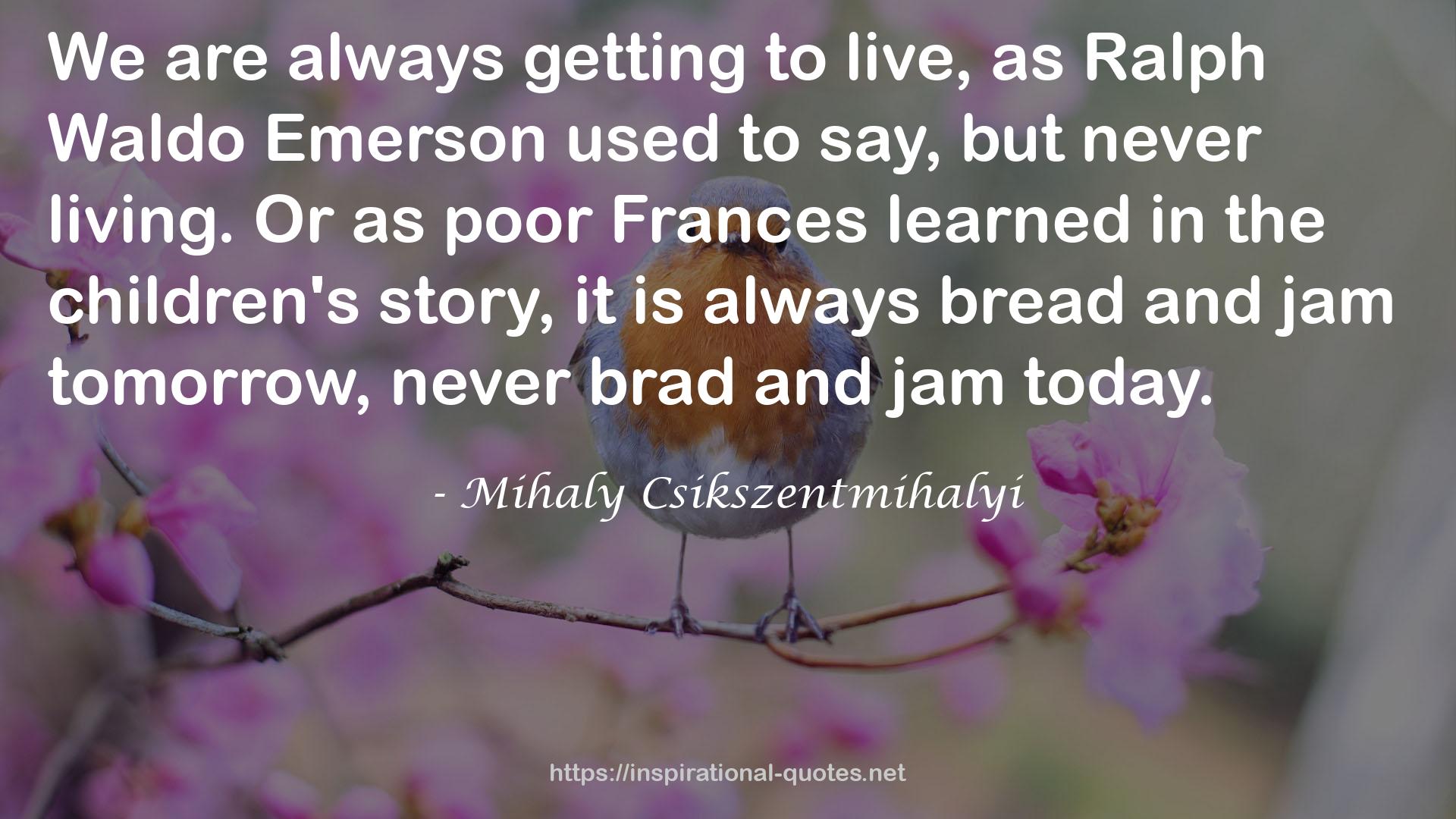103
" is turning all life into a unified flow experience. If a person sets out to achieve a difficult enough goal, from which all other goals logically follow, and if he or she invests all energy in developing skills to reach that goal, then actions and feelings will be in harmony, and the separate parts of life will fit together—and each activity will “make sense” in the present, as well as in view of the past and of the future. In such a way, it is possible to give meaning to one’s entire life. But isn’t it incredibly naive to expect life to have a coherent overall meaning? After all, at least since Nietzsche concluded that God was dead, philosophers and social scientists have been busy demonstrating that existence has no purpose, that chance and impersonal forces rule our fate, and that all values are relative and hence arbitrary. It is true that life has no meaning, if by that we mean a supreme goal built into the fabric of nature and human experience, a goal that is valid for every individual. But it does not follow that life cannot be given meaning. Much of what we call culture and civilization consists in efforts people have made, generally against overwhelming odds, to create a sense of purpose for themselves and their descendants. It is one thing to recognize that life is, by itself, meaningless. It is another thing entirely to accept this with resignation. The first fact does not entail the second any more than the fact that we lack wings prevents us from flying. From the point of view of an individual, it does not matter what the ultimate goal is—provided it is compelling enough to order a lifetime’s worth of psychic energy. The challenge might involve the desire to have the best beer-bottle collection in the neighborhood, the resolution to find a cure for cancer, or simply the biological imperative to have children who will survive and prosper. As long as it provides clear objectives, clear rules for action, and a way to concentrate and become involved, any goal can serve to give meaning to a person’s life. In the past few years I have come to be quite well acquainted with several Muslim professionals—electronics engineers, pilots, businessmen, and teachers, mostly from Saudi Arabia and from the other Gulf states. In talking to them, I was struck with how relaxed most of them seemed to be even under strong pressure. “There is nothing to it,” those I asked about it told me, in different words, but with the same message: “We don’t get upset because we believe that our life is in God’s hands, and whatever He decides will be fine with us.” Such implicit faith used to be widespread in our culture as well, but it is not easy to find it now. Many of us have to discover a goal that will give meaning to life on our own, without the help of a traditional faith. "
― Mihaly Csikszentmihalyi , Flow: The Psychology of Optimal Experience
108
" the phenomenology of enjoyment has eight major components. When people reflect on how it feels when their experience is most positive, they mention at least one, and often all, of the following. First, the experience usually occurs when we confront tasks we have a chance of completing. Second, we must be able to concentrate on what we are doing. Third and fourth, the concentration is usually possible because the task undertaken has clear goals and provides immediate feedback. Fifth, one acts with a deep but effortless involvement that removes from awareness the worries and frustrations of everyday life. Sixth, enjoyable experiences allow people to exercise a sense of control over their actions. Seventh, concern for the self disappears, yet paradoxically the sense of self emerges stronger after the flow experience is over. Finally, the sense of the duration of time is altered; hours pass by in minutes, and minutes can stretch out to seem like hours. The combination of all these elements causes a sense of deep enjoyment that is so rewarding people feel that expending a great deal of energy is worthwhile simply to be able to feel it. "
― Mihaly Csikszentmihalyi , Flow: The Psychology of Optimal Experience

117
" Wake up in the morning with a specific goal to look forward to. Creative individuals don’t have to be dragged out of bed; they are eager to start the day. This is not because they are cheerful, enthusiastic types. Nor do they necessarily have something exciting to do. But they believe that there is something meaningful to accomplish each day, and they can’t wait to get started on it. Most of us don’t feel our actions are that meaningful. Yet everyone can discover at least one thing every day that is worth waking up for. It could be meeting a certain person, shopping for a special item, potting a plant, cleaning the office desk, writing a letter, trying on a new dress. It is easier if each night before falling asleep, you review the next day and choose a particular task that, compared to the rest of the day, should be relatively interesting and exciting. Then next morning, open your eyes and visualize the chosen event—play it out briefly in your mind, like an inner videotape, until you can hardly wait to get dressed and get going. It does not matter if at first the goals are trivial and not that interesting. The important thing is to take the easy first steps until you master the habit, and then slowly work up to more complex goals. Eventually most of the day should consist of tasks you look forward to, until you feel that getting up in the morning is a privilege, not a chore. "
― Mihaly Csikszentmihalyi , Creativity: Flow and the Psychology of Discovery and Invention